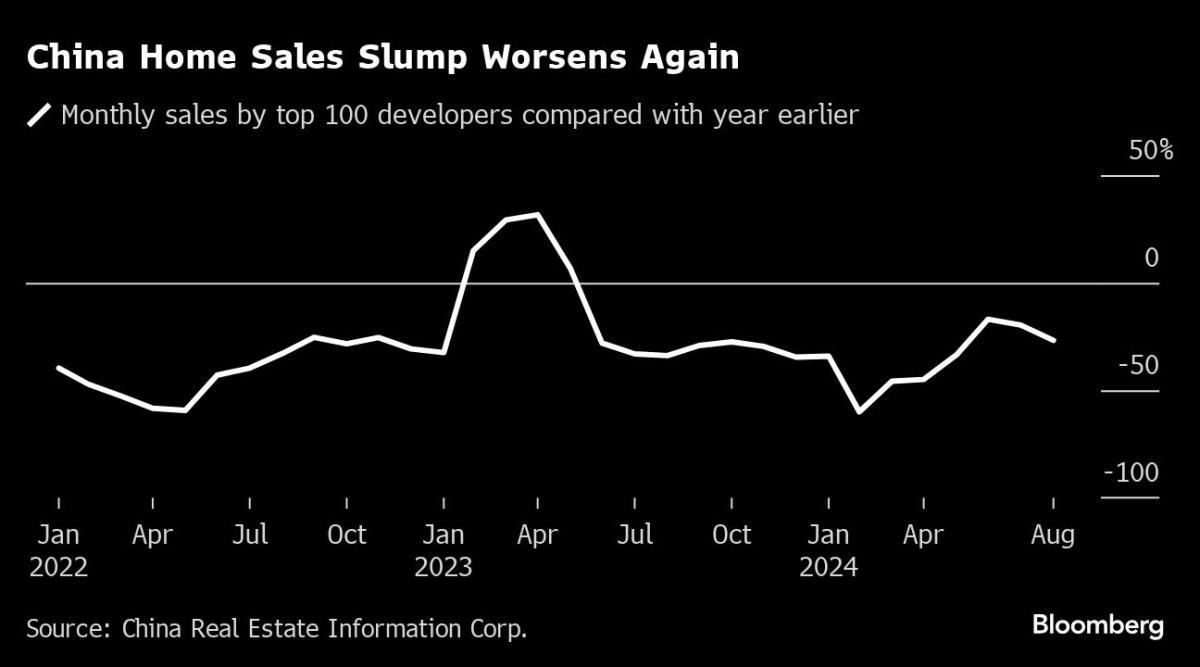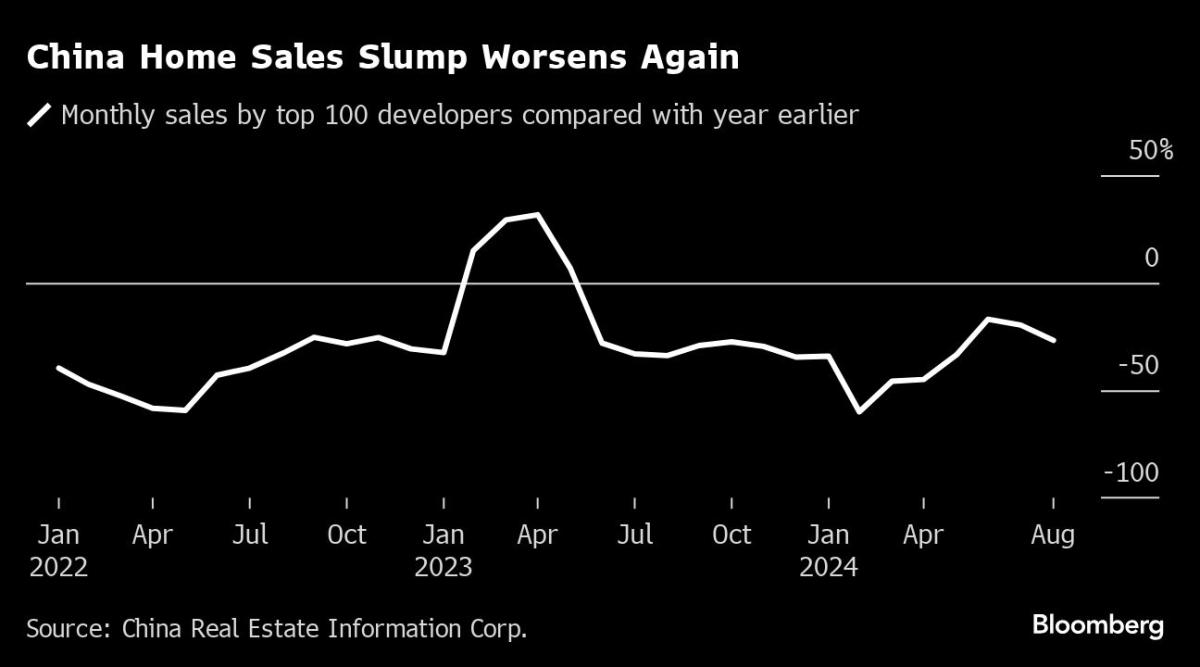
(Bloomberg) — In May, China’s central government urged more than 200 cities to buy unsold homes to ease oversupply. More than three months later, only 29 have heeded the call.
Most Read from Bloomberg
The glacial pace of implementation — driven in large part by the unattractive economics of the plan for local governments — underscores the challenge President Xi Jinping faces as he tries to arrest a record property slump that’s threatening to undermine the country’s growth targets.
The plan has been a key part of the government’s attempt to shore up the real estate sector, while achieving Xi’s goal of creating more affordable housing. The disappointing progress raises the pressure for more forceful measures as China tries to deal with 382 million square meters of excess inventory, equivalent to the size of Detroit.
“Local governments have made slow headway,” Ding Zu Yu, chairman of real estate information platform Shanghai CRIC Info Tech Co., wrote in a late August report. Purchases stood at only 1.9% of unsold apartments nationwide as of July, Ding estimates.
Local bureaucrats are reconciling the demands from Beijing while trying to be prudent about costs. Buying apartments at this point makes little financial sense for those officials, as apartment prices are expected to drop at least another 30% in major cities before stabilizing, according to Jefferies Financial Group Inc.
Estimated returns from turning inventory into affordable housing are also below the cost of funding. Rental yields in China’s tier-1 cities averaged just 1.4% in 2023, compared with the central bank’s funding rate of 1.75%, according to Macquarie Group Ltd.
A few cities have proposed to resort to heavy bargaining to minimize their risks, raising doubts on whether distressed developers would be willing to sell their inventory. In southern Guangdong, Foshan city proposed to buy at no more than 50% of prices of similar projects nearby. Within the same province, Dongguan city plans to price for-sale affordable housing at around 50% of new-home values in a survey, meaning buying costs would be even lower than that.
The potential for improved returns exists only if unsold homes were bought at a significant discount, said Tyran Kam, senior director on Asia-Pacific Corporate Ratings at Fitch. But local governments might also be wary of doing this because of the “socio-political repercussions for local homeowners,” he said.
The move risks further stressing local finances that are already on shaky ground. Regional governments’ ability to spur growth has been undermined by a record drop of income from land sales, with their budget spending shrinking in the first seven months. Among all 31 provinces and municipalities, only Shanghai recorded a fiscal surplus in the first half.
“We do not expect a wide rollout of the purchase program due to the lack of funding and the fact that banks and state-owned firms need to bear the full credit and investment risks,” said Zerlina Zeng, senior credit analyst at Creditsights Singapore LLC.
A Bloomberg index of major Chinese developers dropped as much as 1% on Wednesday to the lowest since late April. That followed a heavy decline the previous day, after some builders were removed from a program that connects the Shanghai and Shenzhen bourses to the Hong Kong exchange.
Central Bank Program
After the People’s Bank of China unveiled the initiative in May, the central bank called on more than 200 cities to advance the plan, according to a state media report. The next month, the housing ministry pushed the program to be widened to counties, meaning 387 lower prefectures were also encouraged to join.
Authorities in at least 60 cities have voiced support for the initiative, according to China Index Holdings. But not many have announced detailed rules to pave the way for implementation, said its research director Chen Wenjing.
While state buying of housing inventory is widely seen as a key step toward easing the glut, uptake of the central bank’s funding support has also been low.
Only 12.1 billion yuan ($1.7 billion), or 4% of the PBOC’s 300 billion yuan relending program had been utilized as of the end of June, public data showed.
The limited usage of existing financing programs signals that the returns and cash flow from social housing are “insufficient” to service associated debt, Fitch Ratings analysts wrote in an Aug. 29 note.
Analysts have also been skeptical about whether the central bank funding is sufficient, as it’s just a fraction of the 1 trillion yuan to 5 trillion yuan that is needed to fix the supply-demand mismatch.
WATCH: Inside China’s Property Crisis
To address funding concerns, China is considering letting local governments use special loans to purchase excess residential units, which would give them access to as much as 1.6 trillion yuan of funding, Bloomberg reported last month. That would be more than enough to fund the home-buying program, which is expected to not exceed 1 trillion yuan for 2024-2025, according to Bloomberg Intelligence.
Relaxing Rules
Stringent purchasing requirements have also added to the challenges. In May, a suburban district in Hangzhou stipulated that potential targets be completed en-bloc assets with enough car parking space. Chongqing demands that building selections have a subway station, school and hospital within a kilometer.
Still, other cities with similar requests are lowering the bar. In August, the southern tech hub of Shenzhen stopped requiring that target assets be fully constructed. Zhaoqing city in southern Guangdong province ceased limiting purchases to en-bloc buildings. Shangqiu city in central Henan province has dropped its location standards.
“More cities are likely to ease their rules to expand the pool of potential targets,” Ding wrote.
But for now, China may struggle to sell its home bailout plan to local governments, said Bloomberg Intelligence analyst Kristy Hung. “The meager rental yields hardly justify the risk.”
(Updates with stock reaction in the tenth paragraph.)
Most Read from Bloomberg Businessweek
©2024 Bloomberg L.P.
EMEA Tribune is not involved in this news article, it is taken from our partners and or from the News Agencies. Copyright and Credit go to the News Agencies, email news@emeatribune.com Follow our WhatsApp verified Channel





